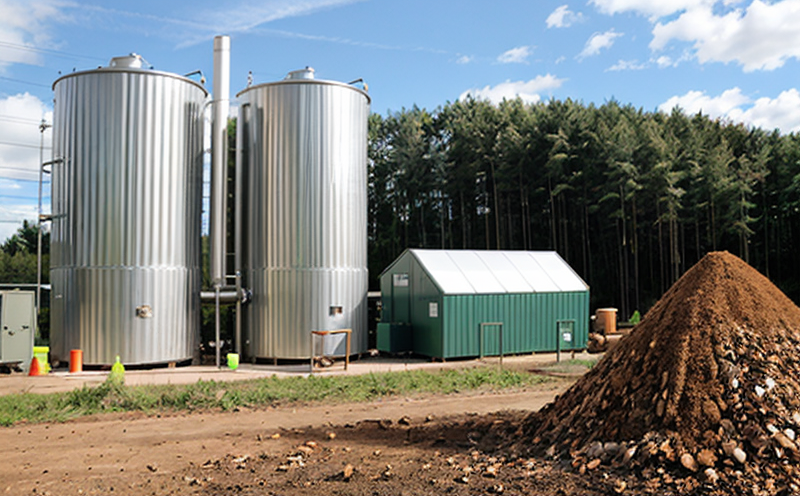ISO 23880 Heavy Metals in Waste-to-Energy Residues
The ISO 23880 standard pertains to the determination of heavy metals in waste-to-energy residues. This service plays a crucial role in ensuring that waste-to-energy conversion processes comply with stringent environmental regulations and contribute positively to sustainability goals.
Heavy metals, including lead (Pb), cadmium (Cd), mercury (Hg), chromium (Cr), and nickel (Ni), are known for their persistence in the environment. Their presence in waste-to-energy residues can have adverse effects on human health and ecosystems if not managed properly. ISO 23880 provides a standardized method to quantify these elements, ensuring that facilities operate within legal limits.
The testing process involves collecting samples from various stages of waste processing, including feedstocks, combustion gases, and final residue products. Specimens are then prepared through digestion techniques using strong acids like nitric acid (HNO₃) and perchloric acid (HClO₄). Once digested, the solution is analyzed via inductively coupled plasma mass spectrometry (ICP-MS) or atomic absorption spectroscopy (AAS), which offer high precision and accuracy.
Compliance with ISO 23880 not only mitigates risks associated with heavy metal contamination but also supports broader sustainability initiatives. By adhering to this standard, organizations demonstrate their commitment to reducing environmental impact and promoting responsible waste management practices.
- Regulatory Compliance: Ensures adherence to national and international regulations regarding hazardous materials.
- Sustainability Reporting: Provides data for transparent reporting on sustainability performance.
- Risk Management: Identifies potential hazards early, allowing for proactive mitigation measures.
- Quality Assurance: Validates the effectiveness of waste management protocols and processes.
The expertise at Eurolab ensures that every test conducted adheres strictly to ISO 23880 requirements. Our team includes highly trained professionals who understand both the technical aspects and broader implications of heavy metal analysis in waste-to-energy contexts.
By leveraging advanced analytical techniques, we provide accurate results that guide decision-making processes aimed at enhancing operational efficiency while safeguarding public health and environmental integrity.
Eurolab Advantages
Eurolab stands out in providing ISO 23880 heavy metals testing services due to our comprehensive approach, advanced facilities, and experienced staff. Our commitment to excellence translates into reliable data that supports informed decision-making for our clients.
- State-of-the-Art Facilities: Equipped with cutting-edge instrumentation such as ICP-MS and AAS equipment.
- Experienced Technicians: Highly skilled professionals who keep abreast of the latest developments in analytical chemistry.
- Comprehensive Services: Offering a full suite of services from sample collection to final report generation.
- Accurate Results: Ensuring precision and reliability through rigorous quality control measures.
We pride ourselves on offering not just tests but also valuable insights that help our clients navigate complex regulatory landscapes. With Eurolab, you can trust in receiving top-notch service tailored to meet your specific needs.
Why Choose This Test
- Ensure Compliance: Stay ahead of regulatory changes by continuously monitoring heavy metal levels in waste-to-energy residues.
- Enhance Reputation: Demonstrate your commitment to environmental responsibility and sustainable practices.
- Promote Safety: Protect communities from potential health risks associated with excessive heavy metals.
- Increase Efficiency: Optimize waste management processes based on detailed analytical data.
- Support Innovation: Gain valuable information to develop new technologies or improve existing ones for better performance and reduced environmental impact.
- Comprehensive Analysis: Receive comprehensive reports that go beyond mere numbers, offering actionable insights into various aspects of your waste-to-energy operations.
Selecting ISO 23880 heavy metals testing ensures you gain a competitive edge by staying compliant with global standards and contributing to global sustainability efforts. Eurolab’s dedicated team will guide you through the entire process, ensuring seamless integration into your existing workflows.
Environmental and Sustainability Contributions
The testing of heavy metals in waste-to-energy residues is essential for several reasons, particularly when considering environmental and sustainability impacts. Heavy metals can accumulate in the environment over time, posing significant risks to flora, fauna, and human health.
By conducting ISO 23880 tests, facilities engaged in waste-to-energy processes ensure that they are not only meeting regulatory requirements but also contributing positively to broader sustainability goals. These tests provide valuable data on residual levels of hazardous substances, allowing for informed decisions regarding process optimization and waste management strategies.
The results from these analyses can be used to refine operational procedures, implement corrective actions where necessary, and continually improve overall performance. Additionally, transparent reporting based on accurate test outcomes fosters trust among stakeholders—both internal personnel involved in day-to-day operations as well as external parties such as regulators, investors, and local communities.
Through consistent adherence to ISO 23880 standards, organizations demonstrate their dedication to environmental stewardship. This not only enhances brand reputation but also aligns with increasingly stringent international guidelines aimed at reducing pollution and promoting sustainable development.





